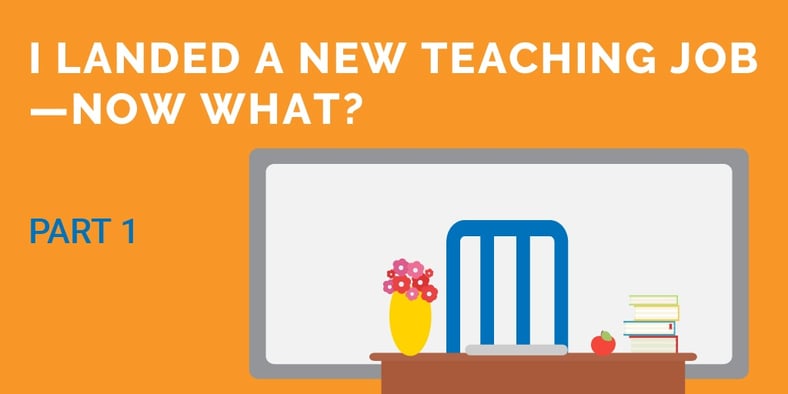
This is the time of year when educators are finding new and different teaching jobs. Whether it’s the first job right out of college or changing schools after many years, the process of starting somewhere new can be pretty overwhelming.
As You Leave
Leaving isn’t easy most of the time. Unless this is a forced change or a terrible situation, saying goodbye can be very emotional. I‘ve changed jobs a few times over the years, and have learned some tricks to help make the transition easier—both for myself and for those around me. Here are some things to consider as you change gears:
- Make sure you tell those closest to you in person: We often use email as our primary means to communicate, but when it comes to telling your team and your principal, it needs to be done in person.
- Tell your students yourself: This may seem silly, but they will hear about it somewhere if not from you. After building strong connections over the year, it is important to honor that relationship by telling them yourself—and this can be way harder than telling the adults sometimes.
- Try to keep it positive: One wise teacher I knew once told me that when people leave jobs,it’s similar to breaking up with a significant other. There are often conflicting emotions, and people can sometimes make situations worse to rationalize leaving. Most of the time, they don’t realize they are doing it. As you leave, try to be positive about the transition. It helps to have a catchphrase that can be said to anyone, such as, “I’m sad to leave, but really excited for the new opportunity.” This keeps situations from becoming negative or awkward.
- Start packing: Talk about overwhelming! Even after just a few years in a room, it is amazing what can be accumulated. Please do not leave things behind “in case the next person wants them.” Trust me—the next person does not. This is the time to purge and move to electronic files if you haven’t yet. Start scanning any paperwork you have so you don’t have to haul a bunch of files around.
- Think through a computer transfer: To further my previous point, be sure to hold on to anything important. There are a lot of options for this, but more than once, I have had a teacher not plan ahead and lose a lot of valuable information. External hard drives are a great option if files are large in size, and are usually pretty easy and quick. Another good option is cloud storage, but this can be limited and a little cumbersome. I created a new personal Gmail account, shared everything to that, and then shared it back to my Google Edu address at my new job.
A final option would be to see if it's possible to have both new and old computers at the same time. This way, you can transfer files directly to a USB drive and then plug it into the new computer to make sure nothing gets lost. Regardless of the system, just make sure there is a plan. Teacher drives and open email addresses can become a liability for districts, so they typically shut them down quickly after the employee leaves. - Start picking the brains of teachers around you if you are making a change: This is especially true of a grade level change, but even throughout the same grade level, good teachers beg, borrow, and steal. Ask around to observe classrooms during your planning time of the new grade level you are moving to. There are developmental differences in all different grades—even from juniors to seniors. Try to learn as much as you can about those differences while you have access to good people around you.
- Leave with grace: At my building, we try to send off people with a celebration. Again, this can be hard for people at times depending on the circumstances. Not participating gracefully can cause hard feelings with those who aren’t leaving. Keep a smile on and give lots of hugs. Schools are families and it is hard to see those we care about move on, regardless of the circumstance.
- If you have an exit interview, be honest: This probably goes without saying, but if you have the chance to help the school improve on your way out, it is critical to be honest. It's tempting to think, “This isn’t my problem anymore,” but if a principal or HR coordinator is willing to take the time to ask you, they want your honest feedback.
Leaving can be tough, but with some of these pointers, it can be less stressful and more positive for all those involved. Over the next two posts in this series, we will discuss how to get started at your new school and build positive relationships.
Looking to better prepare yourself for the next step in your career? Take a look at MimioConnect—our online educator community—where you can access interactive lessons and connect with other educators.



